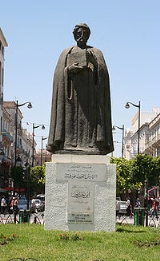
Ibn Khaldun
Overview
Arab
Arab people, also known as Arabs , are a panethnicity primarily living in the Arab world, which is located in Western Asia and North Africa. They are identified as such on one or more of genealogical, linguistic, or cultural grounds, with tribal affiliations, and intra-tribal relationships playing...
Tunisian
Tunisia
Tunisia , officially the Tunisian RepublicThe long name of Tunisia in other languages used in the country is: , is the northernmost country in Africa. It is a Maghreb country and is bordered by Algeria to the west, Libya to the southeast, and the Mediterranean Sea to the north and east. Its area...
historiographer and historian who is often viewed as one of the forerunners of modern historiography
Historiography
Historiography refers either to the study of the history and methodology of history as a discipline, or to a body of historical work on a specialized topic...
, sociology
Sociology
Sociology is the study of society. It is a social science—a term with which it is sometimes synonymous—which uses various methods of empirical investigation and critical analysis to develop a body of knowledge about human social activity...
and economics
Economics
Economics is the social science that analyzes the production, distribution, and consumption of goods and services. The term economics comes from the Ancient Greek from + , hence "rules of the house"...
He is best known for his Muqaddimah
Muqaddimah
The Muqaddimah , also known as the Muqaddimah of Ibn Khaldun or the Prolegomena , is a book written by the Maghrebian Muslim historian Ibn Khaldun in 1377 which records an early view of universal history...
(known as Prolegomenon in English), which was discovered, evaluated and fully appreciated first by 19th century Europe
Europe
Europe is, by convention, one of the world's seven continents. Comprising the westernmost peninsula of Eurasia, Europe is generally 'divided' from Asia to its east by the watershed divides of the Ural and Caucasus Mountains, the Ural River, the Caspian and Black Seas, and the waterways connecting...
an scholarship, although it has also had considerable influence on 17th-century Ottoman
Ottoman Empire
The Ottoman EmpireIt was usually referred to as the "Ottoman Empire", the "Turkish Empire", the "Ottoman Caliphate" or more commonly "Turkey" by its contemporaries...
historians like Ḥajjī Khalīfa and Mustafa Naima
Mustafa Naima
Muṣtafa Na'īmā was an Ottoman bureaucrat and historian who wrote the chronicle known as the Ta'rīkh-i Na'īmā...
who relied on his theories to analyze the growth and decline of the Ottoman empire
Ottoman Empire
The Ottoman EmpireIt was usually referred to as the "Ottoman Empire", the "Turkish Empire", the "Ottoman Caliphate" or more commonly "Turkey" by its contemporaries...
.
Unanswered Questions
Quotations
The sciences of only one nation, the Greeks|Greeks, have come down to us, because they were translated through Al-Ma'mun|Al-Ma'mun's efforts. He was successful in this direction because he had many translators at his disposal and spent much money in this connection.
![]()
Eventually, Aristotle|Aristotle appeared among the Greeks. He improved the methods of logic and systematized its problems and details. He assigned to logic its proper place as the first philosophical discipline and the introduction to philosophy. Therefore he is called the First Teacher.![]()
Muqaddimah, Translated by Franz Rosenthal, p.39 and p.383, Princeton University Press, 1981.

